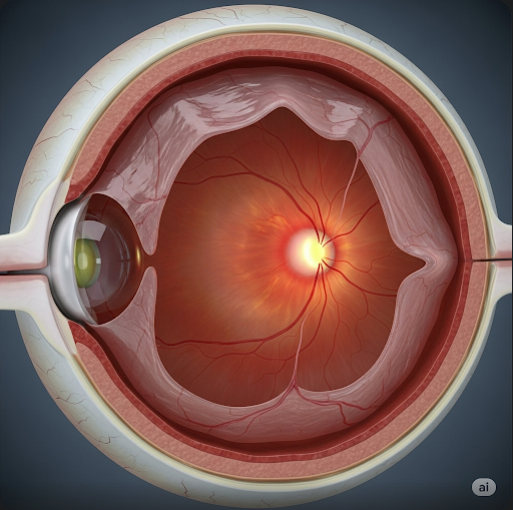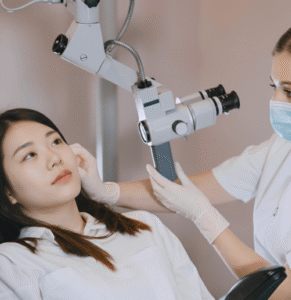Overview
Retinal detachment is a serious eye condition in which the retina, a thin layer of tissue at the back of the eye responsible for capturing light and sending visual signals to the brain, becomes separated from its normal position. This separation deprives the retinal cells of oxygen and nutrients, leading to vision loss if not treated promptly. Retinal detachment is considered an emergency that requires immediate medical attention to prevent permanent blindness.
What is Retinal Detachment?
Retinal detachment occurs when the retina pulls away from the underlying supportive tissue. This may happen due to tears, holes, or traction caused by abnormal tissue growth or fluid accumulation. Because the retina plays a vital role in vision, its separation disrupts the normal visual process. The condition can affect one or both eyes and can develop suddenly or over time, depending on the cause.
Symptoms
Common symptoms of retinal detachment include
- Sudden appearance of floaters (tiny spots or lines drifting across the field of vision)
- Flashes of light in one or both eyes
- Blurred or distorted vision
- Gradual reduction of side (peripheral) vision
- A shadow or curtain-like effect spreading across the visual field
- Sudden and significant vision loss in severe cases
Causes
Retinal detachment can be triggered by several underlying factors, including
- Retinal tears or holes allowing fluid to seep behind the retina
- Eye injuries or trauma
- Advanced diabetic eye disease causing scar tissue on the retina
- Severe nearsightedness (myopia), which stretches and thins the retina
- Age-related changes leading to vitreous shrinkage and pulling on the retina
- Complications from previous eye surgeries
Risk Factors
Certain conditions increase the likelihood of retinal detachment, such as
- Age over 50
- Family history of retinal detachment
- Extreme nearsightedness
- Previous retinal detachment in the other eye
- History of severe eye injury
- Diabetic retinopathy or other retinal diseases
- Eye surgery, such as cataract removal
Complications
If untreated, retinal detachment can lead to
- Permanent vision loss or blindness in the affected eye
- Development of scar tissue that distorts vision (proliferative vitreoretinopathy)
- Recurrent detachments requiring additional surgery
- Chronic eye inflammation or pain
Prevention
While not all cases can be prevented, risk can be reduced by
- Protecting eyes from trauma with safety eyewear during risky activities
- Managing underlying conditions like diabetes
- Having regular eye exams, especially for those at high risk
- Seeking immediate medical attention if new floaters, flashes, or vision changes appear
- Avoiding high-impact activities after eye surgery unless cleared by a doctor
Treatment Options in Korea
South Korea offers advanced ophthalmology services and cutting-edge surgical techniques for retinal detachment.
1. Laser Photocoagulation – A focused laser is used to seal retinal tears or holes before they progress to detachment.
2. Cryopexy (Freezing Treatment) – Freezing is applied to the retina to seal tears and prevent fluid leakage.
3. Pneumatic Retinopexy – A gas bubble is injected into the eye to push the retina back into place, followed by laser or cryotherapy sealing.
4. Scleral Buckling Surgery – A silicone band is placed around the eye to push the wall inward and allow the retina to reattach.
5. Vitrectomy – The vitreous gel is removed and replaced with a gas or silicone oil bubble to reattach the retina.
6. Post-Surgery Rehabilitation – Vision therapy, protective eyewear, and follow-up imaging are used to ensure recovery and prevent recurrence.
7. Leading Korean Eye Hospitals for Retinal Detachment
- Seoul National University Hospital – Department of Ophthalmology
- Kim’s Eye Hospital – Retina Center
- B&VIIT Eye Center – Advanced Retinal Surgery Unit
- Asan Medical Center – Eye Clinic













